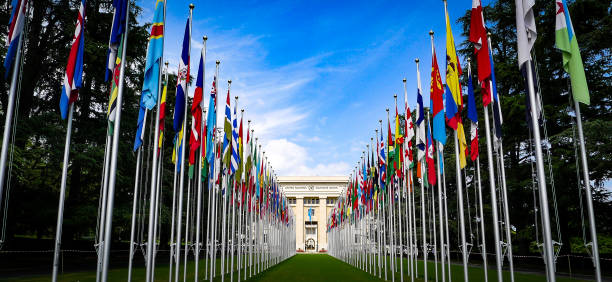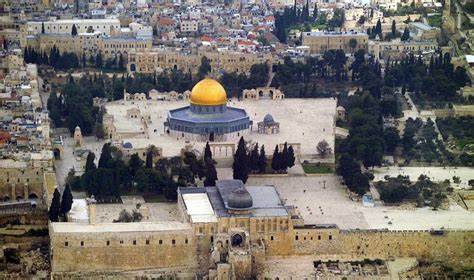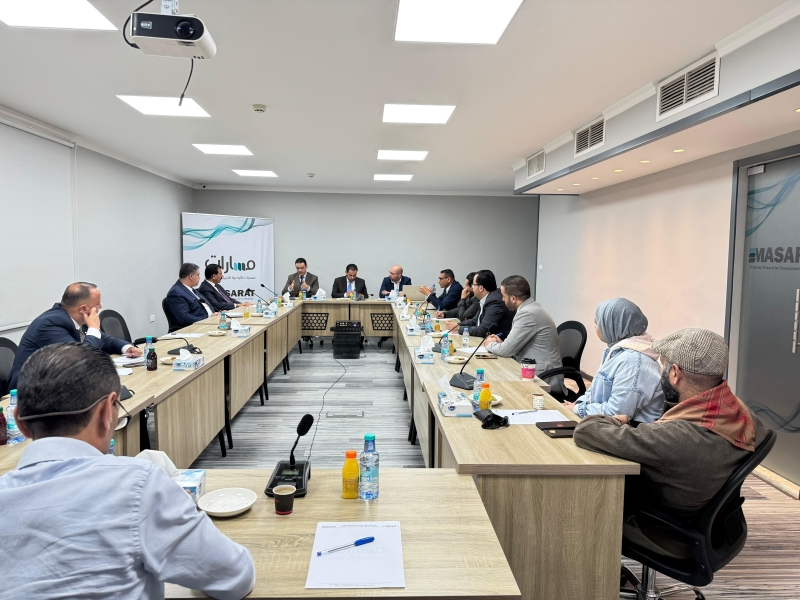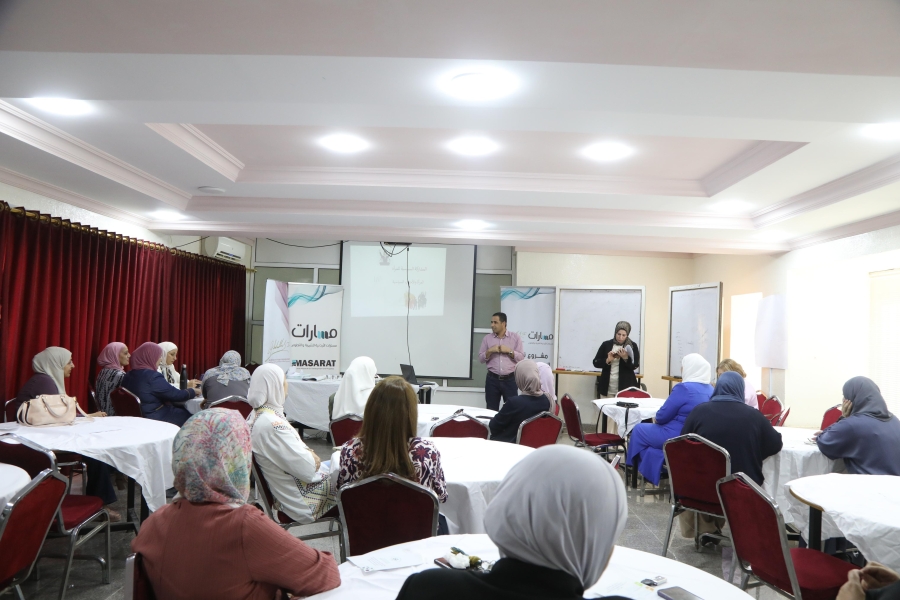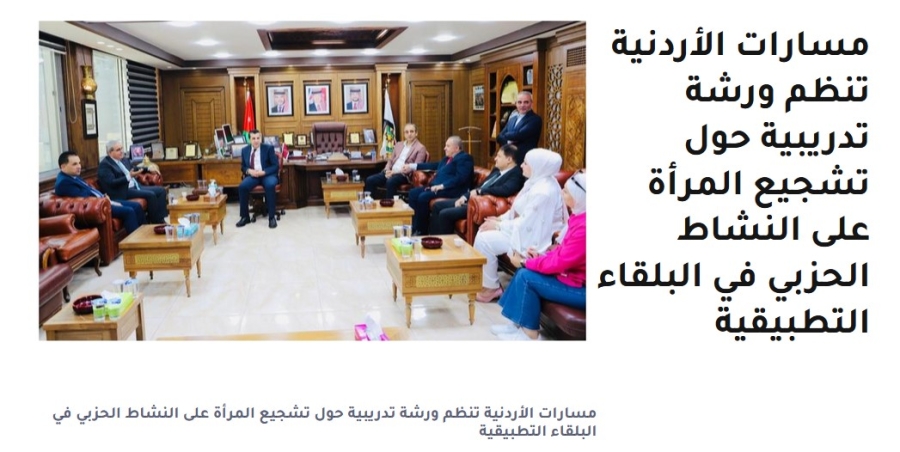“مسارات الأردنية”.. كيف يمكن توظيف الأوراق النقاشية في عملية الإصلاح؟
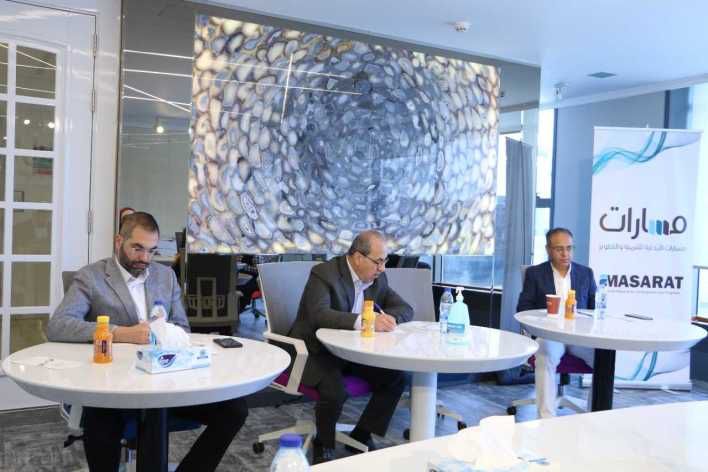
عقد مركز مسارات الأردنية للتنمية والتطوير، جلسة حوارية مغلقة مع مجموعة من الشخصيات السياسية، تحت عنوان "الأوراق النقاشية كأساس للإصلاح”، لمناقشة مدى إمكانية اتخاذ الأوراق النقاشية كقاعدة أساسية للانطلاق في عملية الإصلاح الشامل، سياسيا وإداريا واقتصاديا واجتماعيا.
مقدمة: دقيقة هي المرحلة التي يعشيها الأردن ومتعددة هي الأزمات التي طفت على السطح خلال الفترة الماضية، ومعالجة عديد أزمات تظهر بشكل متتالي ومن وقت لآخر تستدعي التفكير في خطوات إصلاحية جديدة تهدف إلى معالجة اختلالات قائمة تفرز مثل هذه الأزمات، أو السير خطوات للأمام للوصول إلى ديمقراطية ناجزة، تعزز مشاركة الفرد في عملية صناعة القرار، وتقلص فجوة الثقة المتعاظمة بين المواطن والمؤسسات المختلفة.
أشار جلالة الملك في رسالته لرئيس لجنة تحديث المنظومة السياسية إلى الاسترشاد بالأوراق النقاشية الملكية التي نشرها جلالته للأردنيين على مدى سنوات وقدم فيها أفكاره حول رؤيته لكثير من الملفات والقضايا، ولإدراك كيف ينظر المجتمع بنخبه وعامته لهذه الأوراق ومدى نجاعة فكرة أن تكون هذه الأوراق وما تضمنته من أفكار قاعدة للانطلاق نحو النموذج السياسي وتطويره في المرحلة المقبلة.
ومهدت سلسلة اللقاءات التي عقدها جلالته في الديوان الملكي على مدى الأسابيع الماضية الطريق لبدء الحوار حول أهداف الإصلاح ومراميه ومنطلقاته وأدواته، ما دفع بالسياسيين والحزبيين والنقابيين والنشطاء إلى الدخول بحالةٍ من التحرك الإصلاحي الجديد، عبر تكثيف الحوارات الهادفة لإحداث الإصلاح الشامل الحقيقي في المملكة.
ويهدف التحرك الملكي والنخبوي إلى وضع تصور حول مشروع الدولة في القرن الثاني من عمر الدولة والذي يرى جلالة الملك أن تطويره عملية مستمرة، الأمر الذي يتطلب وضع تصورات حول ماهية الصفقة أو الوصفة المطلوبة والتي تساعد على تجاوز هذه المرحلة الدقيقة بكل تجلياتها، وتسهم بشكل حقيقي بإعادة بناء جسور الثقة أولا، واستعادة المواطن ثانيا، ليكون شريكا حقيقيا في عملية البناء والتحديث، من خلال بناء مشروع وطني للمئوية المقبلة، الذي بات حاجة ملحة في ظل ما نشهد من اختلالات، وقصور في بعض المفاصل المهمة، على قواعد إصلاحية وديمقراطية واضحة، تفسح المجال أمام المواطنين والأحزاب السياسية للشراكة الكاملة الحقيقية في عملية صنع القرار.
التوافق على المبدأ ضرورة للإصلاح، كما أن الاتفاق على الهدف النهائي من الإصلاح ضرورة أكثر، إذ يراه البعض حاجة ماسة قبل فوات الأوان بالتجريب وعدم التنفيذ، تداركا لاتساع الأزمة القائمة. في المقابل، هناك من يتحدث من منطلق واقعي وفق وجهة نظره التي ترى أنه لا يجوز أن ننكر الواقع الذي يعيشه البلد، وأن ثمة مسألتان لا يمكن الحديث عن أي إصلاح في الأردن دون حلهما؛ المسألة الأولى هي القوى المحافظة المجتمعية والدينية ورؤيتها للدولة ومستقبلها وحفظ هوية الدولة، والثانية القضية الفلسطينية، وهذا يعيدنا إلى المواطنة المتساوية والدولة المدنية وسيادة القانون.
هذا الرأي يجابه بموقف يرى أن هذه القضايا طالما كانت المبرر لتأجيل الإصلاح الحقيقي المنتج المرتكز على مواطنة حقيقية وتكافؤ فرص، إذ لا تعارض بين الإصلاح وهذين الملفين في حال تم التوافق على الهدف العام. وكخطوة أولية جادة في الطريق نحو الإصلاح الحقيقي والشامل، صدرت الإرادة الملكية، الخميس، بتشكيل اللجنة الملكية لتحديث المنظومة السياسية من 92 عضوا، برئاسة رئيس الوزراء الأسبق العين، سمير الرفاعي، وعضوية 92 شخصية، ووجه جلالة الملك عبد الله الثاني رسالة لرئيس اللجنة حدد فيها المهام المطلوب إنجازها من قبل اللجنة، مشيرا جلالته إلى الأوراق النقاشية التي أصدرها جلالته على مدى ستة أعوام.
وبالنظر إلى مضامين الأوراق النقاشية السبعة، التي أطلقها جلالة الملك في الأعوام (2012 – 2017) لعرض رؤيته لمسيرة الإصلاح الشامل في الأردن في مختلف المجالات، نجد أنها بينت الهدف الأساسي من الإصلاح، وحددت أبرز المهام التي تقع على عاتق الملكية، وأعضاء مجلس الأمة، والحكومة، والأحزاب السياسية، والمواطنين، والذين يمثلون أطراف المعادلة السياسية المنوطة بالإصلاح.
وتمحورت الأوراق النقاشية بشكلٍ أساسي حول التحول الديمقراطي، والوصول إلى الحكومات البرلمانية القائمة على الأحزاب ذات البرامج الفاعلة والقابلة للتطبيق، كما تطرقت الأوراق إلى الحديث عن حماية حرية التعبير عن الرأي السياسي، وتطوير السلطة القضائية والتعليم، بما يُسهم في بناء المستقبل المزدهر الذي يسعى إليه الأردن.
الورقة الأولى: مسيرتنا نحو بناء الديموقراطية المتجددة
الورقة الثانية: تطوير نظامنا الديموقراطي لخدمة جميع الأردنيين.
الورقة الثالثة: أدوار تنتظرنا لنجاح ديموقراطيتنا المتجددة
الورقة الرابعة: نحو تمكين ديمقراطي ومواطنة فاعلة.
الورقة الخامسة: تعميق التحول الديموقراطي: الأهداف والمنجزات والأعراف السياسية.
الورقة السادسة: سيادة القانون أساس الدولة المدنية.
الورقة السابعة: بناء قدراتنا البشرية وتطوير العملية التعليمية جوهر نهضة الأمة وناقش المشاركون في الجلسة مجموعة من المحاور التي لا بد من حسمها أولا قبل اتخاذ الأوراق النقاشية كأرضية لمختلف القضايا المتعلقة بالإصلاح،
وهي:
المحور الأول: الأوراق النقاشية الأوراق النقاشية تعتبر خطوة إيجابية لاعتمادها كأرضية لإطلاق ورشة الإصلاح، لكنها بالضرورة ليست كافية للإصلاح الشامل، كونها لا تغطي الجوانب الاقتصادية والإدارية، بيد أن الأوراق تصلح أن تكون عنوانا للهدف النهائي من التعديلات القانونية والدستورية المطلوبة لتحقيق الإصلاح المنشود، كما تكمن أهميتها في كونها خرجت وجاءت من رأس الدولة.
تصبح الأوراق النقاشية على قدر من الأهمية؛ كونها تصلح لأن تكون عنوانا للهدف النهائي، ليس لأنها مثالية، وليس لأنها اشتملت على كافة المواضيع، فالموضوع الاقتصادي لم تتطرق إليه لا من قريب ولا من بعيد، وهو موضوع لا بد من الوصول إليه، وتوضيح ما إذا كنا نريد اقتصادا ريعيا أو إنتاجيا أو مختلطا، من المؤكد أن الأوراق فيها أمور غير مكتملة لكن على عدم اكتمالها تبقى هي الوثيقة التي لا تنتقد، وخصوصا من تيار "قوى الوضع القائم”.
ثمة رأي يعتقد بأن من المفيد أن تتبنى "اللجنة الملكية” الأوراق النقاشية كهدف نهائي، ثم يتم التنفيذ رجوعا للهدف المتوافق عليه وتطوير المنظومة اللازمة لذلك.
الأوراق النقاشية تحدثت عن الديمقراطية المتجددة وتعزيز مبدأ التعددية السياسية والأسس العملية لمبادئ الفصل والتوازن بين السلطات والفصل بينها وعدم تغول إحداها على أخرى، والانتقال الناجح نحو الحكومات البرلمانية الحزبية، وتعزيز المشاركة الشعبية في صنع القرار، وقبول التنوع والاختلاف في الرأي، ودور الملك في المجتمع كجامع لكل المكونات، وترسيخ مبدأ الدولة المدنية وسيادة القانون، وضمان حقوق الأقليات والمواطنة الفاعلة المتساوية، وتطوير العملية التربوية وبلورة مناهج تفتح أمام النشء أبواب التفكير العميق والناقد وتشجيعهم على طرح الأسئلة، بالمقابل، ثمة رأي يقول إنه لا يمكن البدء من الأوراق النقاشية في الإصلاح، بل إن العملية معكوسة، "نبدأ وسقفنا الهدف وليس الأوراق”، بمعنى أن الأوراق النقاشية هي إحدى المرجعيات لكنها ليست الوحيدة، وهي بمثابة سقف مرجعي للإصلاح، لكنها عبارة عن عناوين بحاجة لمزيد من التفصيل، والأوراق تضمنت مبادئ جميلة لكنها كلام عام يتطلب المزيد من التوضيح للمفاهيم التي تتضمنها وشرح كيفية إنجاز الإصلاح.
هذا الرأي، يرى أن من غير المقبول أن تعمل اللجنة تحديثا للمنظومة السياسية والعمل السياسي في الأردن بسقف مرجعي هو الأوراق النقاشية، "فالأوراق يمكن أن تكون دليلا أو مؤشرا أو شيئا يمكن أن يستعان به للاسترشاد، لكن أن أبدأ به، فالبدء ليس من الأوراق النقاشية، بل من الهدف الذي يجب أن نتوافق عليه ونحدده، هذا الهدف قد يكون متضمنا في الأوراق النقاشية وقد لا يكون”.
الأوراق النقاشية ورغم أنها تعكس كثيرا مبادئ المهمة، لكن من حيث المبدأ أيضا هي كلام عام بحاجة إلى تفاصيل لتحقيقها ومناقشته كيفية العمل لتحقيق المبادئ التي جاءت ضمنها، وذلك يلي الإجابة على عديد أسئلة تننظر الإجابات.
المحور الثاني: اللجنة الملكية اللجنة الملكية لتحديث المنظومة السياسية ليست لجنة إصلاح شامل لكافة النواحي في الأردن، وإنما كلّفها جلالة الملك بتعديل 3 قوانين؛ هي قانون الانتخاب والأحزاب والبلديات واللامركزية، كما سمح لها باقتراح بعض التعديلات الدستورية إذا تطلب الأمر ذلك وكذلك اليات العمل النيابي، بحيث تتعلق هذه التعديلات بالقوانين الثلاثة فقط.
وتحديث القوانين الثلاثة، ينبغي أن يسبقه تحديد الهدف النهائي من التعديل والاتفاق عليه مجتمعيا، لعمل هندسة راجعة وتحديد الخطوات التي ستُمكن اللجنة من الوصول إلى الهدف النهائي؛ لذا لا بد من الاتفاق على الهدف النهائي قبل الخوض في التعديلات القانونية، وهنا تُصبح الأوراق النقاشية على قدر من الأهمية.
اللجنة الملكية ربما توصف بالفرصة الأخيرة، وهو الامر الذي يستوجب جلوس القوى السياسية، والاتفاق على الهدف الذي نسعى لبلوغه، والالتزام والتنفيذ بما يأتي من هذه اللجنة أيضا كفرصة أخيرة لاستعادة ثقة المجتمع الأردني فقد الايمان بمفهوم الإصلاح وحتى يتحقق ذلك يلزم تحديد الإطار الزمني كون المجتمع لم يعد مكترثا بوعود الإصلاح، واستعادة ثقة الناس بالدولة الأردنية وبجديتها باتجاه الإصلاح”، واحد من اهم النقاط التي يمكن تحقيقها.
كما نحتاج إلى تكريس وتعزيز مفهوم البناء التراكمي في الدولة، ليس لدينا استراتيجيات عابرة للحكومات، كل مسؤول يأتي يحذف ما تم العمل عليه من قبله ويتجه نحو الأمام، وأيضا الإصلاح الإداري والاقتصادي يجب أن يسير بخطى واضحة تنعكس على حياة الناس وكل ذلك تحت مظلة الإصلاح السياسي، ضمن إطار زمني يعزز ثقة الشارع بجل العملية.
المحور الثالث: خطط العمل ضرورة التوافق المجتمعي على الهدف النهائي من الإصلاح، الأمر الذي يجعل العملية الإصلاحية سهلة، وضرورة الاتفاق على المبادئ العامة ومعايير وثوابت العيش المشترك داخل المجتمع الأردني، وكيفية تقاسم قوى المجتمع للسلطة والنفوذ والموارد بشكل عادل يضمن للجماعات المختلفة حقوقها الأساسية من أجل الإصلاح والتحديث.
يلي التوافق على الهدف النهائي، التزام الدولة بتنفيذ الأهداف وترجمتها إلى خطط عمل و هو ما تعهد به جلالة الملك من خلال رسالة الى رئيس اللجنة بانه يضمن ان تأخذ الحكومة توصيات اللجنة دون أي تعد او تدخلات، فالأردن أمضى 30 عاما من الحديث عن الإصلاح دون أن يتقدم خطوة في ذلك نحو الأمام”، الامر الذي يستدعي تحديد المدة اللازمة لتنفيذ الإصلاح والوصول للهدف المنشود؛ كأن تمتد من 10 إلى 15 عاما لتحقيق الهدف النهائي.
والحكم النهائي على اللجنة الملكية سيكمن في تقييم مخرجاتها لتحديث المنظومة السياسية، وضرورة وضعها جدولا زمنيا للعمل، وتُطلع المواطنين عليه، حتى وإن كان يمتد لسنواتٍ عديدة، إذ إن وجود خطة زمنية ومعايير للأداء، وربط الخطة بالموازنة والشروع بتنفيذها هو السبيل الوحيد لاسترجاع ثقة المواطن بالمسؤول، ومصير مخرجات اللجنة ومدى الالتزام بها، بها سيقود بالنتيجة الى تقليص فجوة الثقة بين الشعب ومؤسسات الدولة والتي لا يمكن تجاهلها، فردم هذه الفجوة، يتطلب من أعضاء اللجنة الخروج بالتوصيات وترجمتها إلى خطط مجدولة والشروع الفوري بتنفيذها، فيما رأى مشاركون آخرون أن رسم الخطط وإعداد الجداول الزمنية لتنفيذها تُعد خطوات تقليدية بعيدة عن الحداثة والتحديث الذي وجّه به جلاله الملك.
بالمقابل، هناك من يطرح أن التفكير بالتخطيط الزمني لبعض القضايا الإجرائية ممكن، بيد أن الخطط الزمنية ومعايير الأداء صارت سببا للنقمة من المواطن على كل ما له علاقة بالزمن ومعايير الأداء.
المحور الرابع: تعريف الأدوار ضرورة إعادة تعريف الأدوار والمهام وتطبيق الفصل الحقيقي بين المؤسسات المختلفة بما يتسق مع رؤية جلالة الملك، والدستور الذي يوضح تماما ماهية الادرار المناطة بكل سلطة ومؤسسة، واهمية الفصل بينهما ينسجم مع الدستور أولا ومبدأ دولة القانون والمؤسسات ثانيا، وحتى لا تعيق عملية الإصلاح كما في السابق، إذ من المهم الاتفاق مجتمعيا على حدود توزيع الأدوار، وينبغي تحديدها وتعريفها؛ لترجمة الضوابط العملية لمبادئ الفصل والتوازن بين السلطات على أرض الواقع.
يعني ذلك عدم تغول سلطة على أخرى، أنه ليس هناك سلطة تنفيذية أقوى من سلطة تشريعية، أو أقوى من السلطة القضائية، إذا كنا متفقين على الهدف، وهذا ما ورد تفصيلًا في الورقة النقاشية الثالثة التي تكلمت عن الأدوار المطلوبة في ديمقراطيتنا المتجددة.
المحور الخامس: الإصلاح المجتمعي التحدي الحقيقي يكمن في كيفية العمل على الإصلاح، وكيفية خلق التوافقات وتكريس مبدا قبول الرأي الآخر لدى الأردنيين بمختلف توجهاتهم وفرض هذه الثقافة الشعبية؛ لذا فإن الأوراق النقاشية وإن قدمت تصورا مهما حول سيادة القانون والمواطنة الفاعلة، إلا أنها بحاجة لمزيد من التفاصيل في هذا الجانب حول الوصول إلى هذه الثقافة المجتمعية، من خلال استعادة منظومة هذه القيم، فبدونها لا يمكن عمل إصلاح مجتمعي، وأساس ذلك المناهج التعليمية وتحديثها بما يُعزز قبول الآخر، والتركيز فيها على الانتماء للوطن، مع أهمية وجود إرادة بإنفاذ للقانون بعدالة على الجميع لاستعادة هيبة الدولة.
ولأن الإصلاح لا يقتصر على المحور السياسي فحسب، بل ينبغي أن يكون اقتصاديا وإداريا واجتماعيا، ولذا فإن الإصلاح الاجتماعي واستعادة منظومة القيم يضمن استعادة الناس وتبديد حالة الحرد الحاصلة والتي تعكسها ردود الفعل الشعبية في مختلف الأزمات، وتظهر في آن واحد حالة الغضب والإحباط الكامنة لدى الشعب.
وشارك في الجلسة، نائب رئيس الوزراء الأسبق، الدكتور مروان المعشر، ووزير الشؤون البلدية الأسبق، المهندس وليد المصري، ومدير مركز الدراسات الاستراتيجية في الجامعة الأردنية، الدكتور زيد عيادات، والنائب السابق، قيس الزيادين، وزيرة الدولة السابقة لشؤون الإعلام، جمانة غنيمات، وأدار الحوار النائب السابق، الأستاذة وفاء بني مصطفى.
يشار إلى أن "مسارات الأردنية للتنمية والتطوير”، هي مؤسسة مجتمع مدني لا تهدف إلى الربح، تأسست في العام 2021، وتختص بقضايا تعزيز حضور المرأة في الفضاء العام وتمكينها سياسيا واقتصاديا، ودعم وتحفيز مشاركة الشباب في العمل السياسي والتنموي، وتطوير وتعزيز قدرات الإعلام لمواكبة التطورات ليكون أداة للرقابة وسبيلا لتحقيق التنمية المستدامة والديموقراطية.
وتُركز "مسارات” على إجراء الدراسات والأبحاث المتعلقة بالمشهد الأردني ككل، وكذلك عمل قراءات تحليلية تهم صناع القرار في مختلف نواحي الحياة، إضافة إلى إجراء دراسات تحليلية للمشهد السياسي والإعلامي ومضمونهم.


